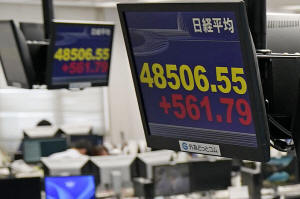World shares are mixed after US stocks retreat, while gold surges higher
[October 08, 2025] By
ELAINE KURTENBACH
Shares have opened higher in Europe but retreated in Asia after U.S.
stocks sank to their first loss in eight days.
The price of gold, which topped $4,000 per ounce for the first time on
Tuesday, continued to rise, trading up nearly $58 at $4,062.10.
Investors have traditionally seen gold as a hedge against high
inflation. Its price has soared more than 50% this year because of
governments’ huge debt loads, political uncertainties and anticipation
that the Fed will cut interest rates.
In France, the CAC 40 gained 0.6% to 8,021.50 as departing Prime
Minister Sébastien Lecornu, aiming to calm the political storm triggered
by his resignation on Monday less than 24 hours after unveiling his
ministers, raced to beat a deadline Wednesday to break a deadlock caused
by his decision to quit.
Germany's DAX rose 0.3% to 24,455.12, while the FTSE 100 also rose 0.3%,
to 9,513.67.
The futures for the S&P 500 and the Dow Jones Industrial Average were
0.2% higher.
The U.S. dollar has risen against the euro, thanks to the upheavals in
France, and also against the Japanese yen.
The yen has fallen sharply on expectations that Sanae Takaichi, the
conservative lawmaker likely to become the next prime minister, will
push to keep interest rates low.
The dollar rose to 152.45 yen from 151.90 yen early Wednesday, while the
euro slipped to $1.1625 from $1.1659.

Tokyo's benchmark Nikkei 225 shed 0.5% to 47,734.99. It had jumped to
new records earlier this week after the ruling Liberal Democrats chose
Takaichi as their leader last weekend. She is expected to increase
spending and to advocate for easier credit, possibly slowing efforts by
the Bank of Japan to raise its key interest rate. It has remained near
zero for years, even as inflation has exceeded its target of about 2%,
outpacing wage increases.
The government reported Wednesday that inflation-adjusted wages fell in
August for the eighth straight month.
“While the economic case for tighter monetary policy remains intact, we
suspect that the Bank of Japan will use the pressure by Japan’s incoming
government as an opportunity to delay rate hikes until January,” Marcel
Thieliant of Capital Economics said in a commentary.

[to top of second column] |

Electronic stock boards show Japan's Nikkei 225 index at a foreign
exchange firm in Tokyo, Tuesday, Oct. 7, 2025. (Kyodo News via AP)
 Lawmakers in Japan's lower house of
parliament are due to elect a successor to Prime Minister Shigeru
Ishiba later this month. The Liberal Democrats hold the most seats
despite not having an outright majority, so Takaishi is expected to
become the country's first female prime minister.
Elsewhere in Asia, Hong Kong's Hang Seng dropped 0.5% to 26,829.46
and the S&P/ASX 200 edged 0.1% lower to 8,947.60.
Markets in mainland China and South Korea were closed for holidays.
In Taiwan, the Taiex lost 0.5%. India's Sensex was up 0.1%.
On Tuesday, the S&P 500 fell 0.4% from its all-time high and the Dow
industrials lost 0.2%. The Nasdaq composite gave up 0.7%.
Tesla was the heaviest weight on the market and dropped 4.4% after
unveiling cheaper versions of two of its electric car models. The
stock gave back most of its leap from the prior day, when
speculation and hype built after Tesla hinted at a coming product
announcement.
Oracle also helped drag the market lower. It fell 2.5% after a news
report suggested it’s making thin profit margins on a key line of
business related to artificial-intelligence technology.
U.S. shares have rushed higher in recent months on hopes that the
economy will remain resilient and that the Federal Reserve will
continue to cut interest rates.
The rapid rise of artificial intelligence has helped fan buying
enthusiasm, but also is raising worries that share prices may have
shot too high.
Much is riding on expectations that the AI investment boom will pay
off by making the global economy more productive and driving more
growth. Without that increased efficiency, inflation could push
higher due to upward pressure coming from the mountains of debt that
the U.S. and other governments worldwide are building.
Also early Wednesday, U.S. benchmark crude oil was up 41 cents at
$62.14 per barrel. Brent crude, the international standard, rose 38
cents to $65.83 per barrel.
All contents © copyright 2025 Associated Press. All rights reserved |